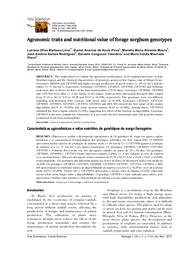Agronomic traits and nutritional value of forage sorghum genotypes.
Agronomic traits and nutritional value of forage sorghum genotypes.
Author(s): LIMA, L. O. B.; PIRES, D. A. de A.; MOURA, M. M. A.; RODRIGUES, J. A. S.; TOLENTINO, D. C.; VIANA, M. C. M.
Summary: This study aimed to evaluate the agronomic performance of 24 sorghum genotypes in four Brazilian regions and the chemical characteristics of genotypes grown in Sete Lagoas, state of Minas Gerais. Genotypes BRS655 and 12F37005 had higher average production of green matter (> 44 ton ha-1) and dry matter (> 17 ton ha-1), respectively. Genotypes 12F38019, 12F40019, 12F37005, 12F37043 and Volumax took more days to flower in three of the four municipalities (75-90 days). Genotypes 12F38006, 12F40006 and 12F37016 were taller (> 2 m). Values of dry matter, crude protein and neutral detergent fiber ranged from 37.15 to 50.13; 5.51 to 10.28 and 43.57 to 65.69%, respectively. The genotypes were not different regarding acid detergent fiber content, with mean value of 34.83%. Genotypes 12F38019, 12F37016, 12F39005, 12F39019, 12F37007, 12F37014, 12F39014 and BRS 655 showed the best values of dry matter digestibility (64.31 to 74.20%) and crude protein content (8.33 to 10.28%). Among them, 12F139014 exhibited the lowest lignin content (3.32%), suggesting less effect of this fraction on digestibility. Genotype 12F39014 is the most suitable for cultivation, as it presented the best nutritional value and good dry matter production in the four municipalities.
Publication year: 2017
Types of publication: Journal article
Unit: Embrapa Maize & Sorghum
Keywords: Composição bromatológica, Desempenho agronômico, Genótipo, Híbrido, Rendimento
Observation
Some of Embrapa's publications are published as ePub files. To read them, use or download one of the following free software options to your computer or mobile device. Android: Google Play Books; IOS: iBooks; Windows and Linux: Calibre.
Access other publications
Access the Agricultural Research Database (BDPA) to consult Embrapa's full library collection and records.
Visit Embrapa Bookstore to purchase books and other publications sold by Embrapa.

